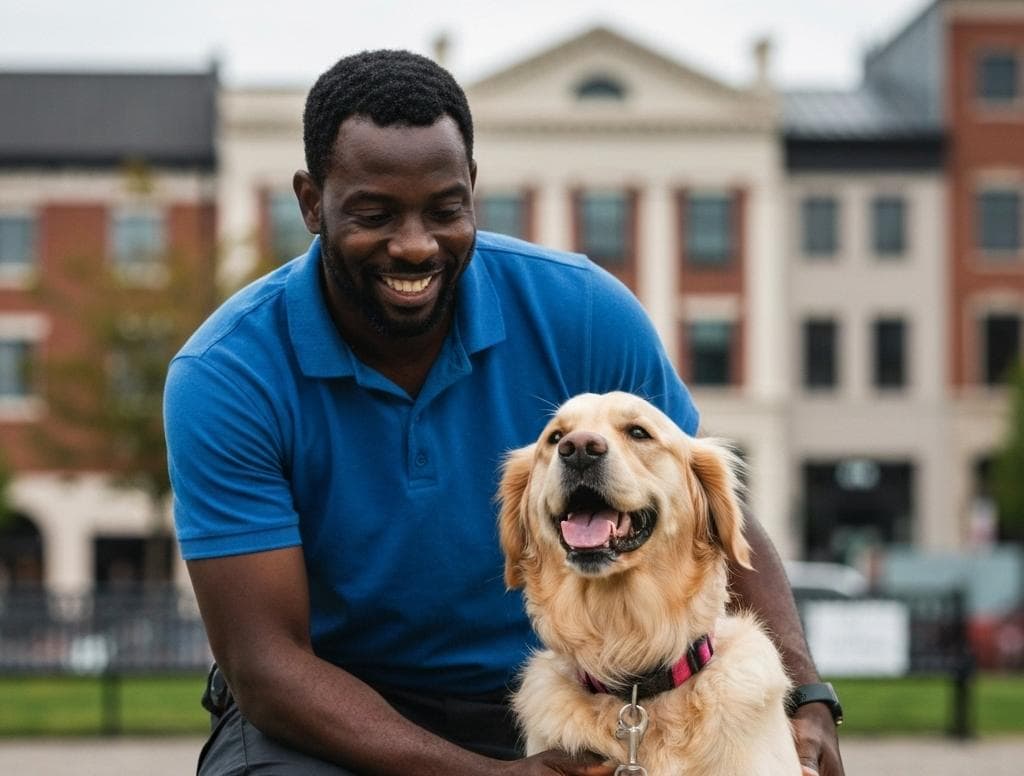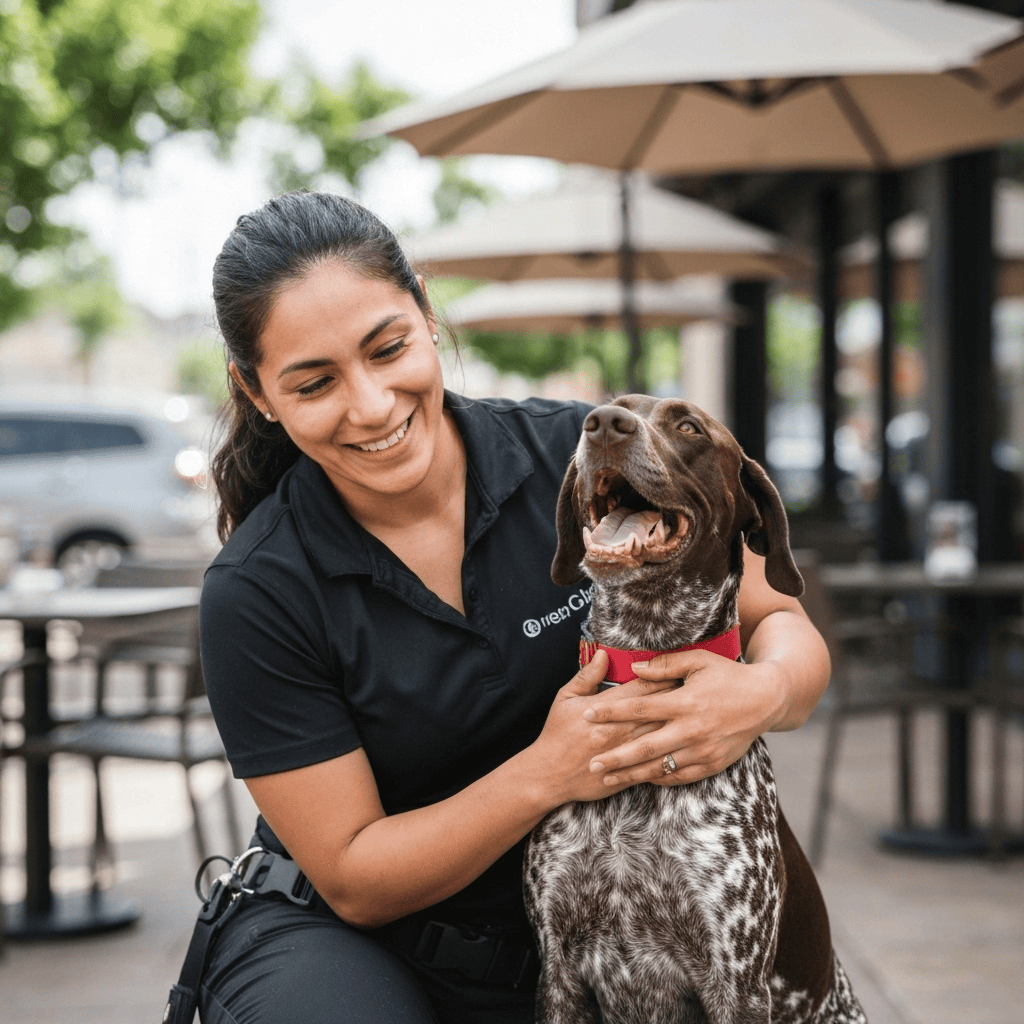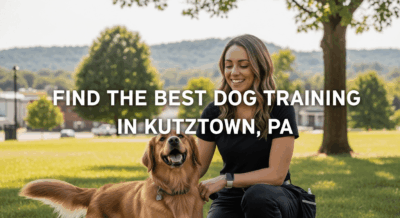Your Complete Guide to Choosing a Dog Trainer in Kutztown
Living in Kutztown means your dog needs to handle a unique mix of situations. One day you’re walking past students hurrying to class on Main Street, and the next you’re on a quiet country road where your dog might encounter farm animals. The bustling energy around Kutztown University creates its own training challenges, especially if you live near campus where foot traffic picks up during the school year.
A good training plan here should prepare your dog for real Kutztown life. That means solid leash skills for navigating sidewalks during KU events, calm greetings when you run into neighbors at Wawa, and reliable recall if you venture onto the trails just outside town.
Finding the Right Trainer for Your Dog
The best trainers understand that every dog learns differently, and they’ll tailor their approach to what motivates your specific pup. Look for someone who uses positive reinforcement methods and can help you practice in real-world situations you’ll actually face around town.
When you’re interviewing potential trainers, ask about their education and experience. While Pennsylvania doesn’t require special licensing for dog trainers, many excellent professionals pursue certifications like CPDT-KA, KPA-CTP, or IAABC-CDBC. These credentials show they’re committed to staying current with humane, science-based methods.
Think about what format makes sense for your goals and schedule. If you’re dealing with door manners when the pizza delivery arrives, or your dog gets overstimulated by campus crowds, in-home training might be your best bet. For dogs who need to work on their social skills or owners who want the motivation of a group setting, puppy classes or basic manners classes work well.
Training Approaches That Work

The most effective training happens when your dog feels safe and engaged in the learning process. Here’s what good trainers in the area typically offer:
Basic manners training covers the essentials like sit, down, stay, and walking nicely on leash. These skills become the foundation for everything else, whether you’re heading to Memorial Park or navigating the sidewalks during Kutztown Folk Festival weekend.
Puppy programs focus on house training, gentle socialization, and preventing common puppy problems before they become ingrained habits. The critical socialization period happens early, so getting started while your puppy is young gives you the best results.
Private lessons work well when you need focused attention on specific issues. Maybe your dog jumps on everyone who comes to the door, or they get reactive when they see other dogs on walks. One-on-one coaching lets you work at your dog’s pace without distractions.
Group classes help proof your training around other dogs and people. They’re also more budget-friendly than private sessions, and many dogs actually learn better with a little social pressure from their classmates.
Some trainers offer day training or board and train programs where they work with your dog during the day or for an extended stay, then teach you how to maintain the training at home. These intensive programs can jump-start progress, but make sure there’s a solid plan for transferring those new skills to you.
What Training Costs Around Kutztown
Prices in Berks County tend to be more reasonable than in major metropolitan areas, but expect to pay more for trainers with advanced credentials or specialized expertise in behavior modification.
| Service Type | Typical Investment | What You Get |
|---|---|---|
| Group classes (4-6 weeks) | $150-$275 | Weekly sessions focusing on basic obedience or puppy fundamentals |
| Private lessons | $100-$160 per session | Customized training plan, usually 60-75 minutes |
| In-home training packages | $400-$800 | Multiple sessions at your home with written homework |
| Day training programs | $450-$900 per week | Professional works your dog 3-5 times weekly plus owner lessons |
| Board and train | $2,000-$4,200 | 2-4 week intensive with transfer sessions |
| Behavior consultation | $140-$250 | Initial assessment for fear, aggression, or anxiety issues |
Many trainers offer a brief consultation to see if you’re a good fit before you commit to a full program. Take advantage of these conversations to get a feel for their approach and communication style.
Important Questions for Potential Trainers
Before you choose someone to work with your dog, make sure you’re comfortable with their methods and experience:
- What training methods do you use, and how do you handle it when a dog makes mistakes?
- Have you worked with dogs who have challenges similar to mine?
- What certifications do you hold, and do you pursue continuing education?
- How are sessions structured, and what kind of homework will I need to do between visits?
- Do you offer different formats like group classes, private lessons, or in-home sessions?
- What are your total fees, including any travel charges or material costs?
- Do you carry liability insurance?
- For serious behavioral issues, do you work with veterinary behaviorists or refer to specialists?
Local Requirements Every Dog Owner Should Know
Understanding the rules helps you train more effectively and keeps you and your dog out of trouble.
Licensing: Pennsylvania requires all dogs over 3 months old to be licensed annually. You can handle this online through the state system at PA Dog License.
Vaccinations: Rabies vaccination is mandatory statewide. Your vet can advise you on other recommended vaccines based on your dog’s lifestyle and risk factors.
Leash laws: Kutztown Borough expects dogs to be leashed in public spaces and parks unless you’re in a designated off-leash area. This makes leash training essential for daily walks around town.
Clean-up requirements: Always carry waste bags when you’re out with your dog. This is especially important on Main Street and in the residential areas around campus where neighbors notice these things.
Noise considerations: If you live in an apartment or close to campus, working on excessive barking and separation anxiety becomes more urgent. Your trainer can help you create management strategies that keep the peace with neighbors.
For specific borough regulations, check the official website at Kutztown Borough. Statewide dog law information is available through the PA Department of Agriculture at PA Dog Law.
Great Places to Practice Your Training
Start your training in quiet spots where your dog can focus, then gradually work up to busier environments as their skills improve.
The residential streets around campus work well for early leash training sessions when students aren’t around. You can practice basic commands and loose-leash walking without too many distractions.
Main Street offers excellent real-world training opportunities once your dog has the basics down. The foot traffic and interesting smells provide perfect chances to practice “leave it” and calm greetings.
Memorial Park gives you space to work on longer-distance recalls and down-stays, though you’ll need to keep your dog leashed unless there’s a designated off-leash area.
Local Resources for Dog Owners
Having good places to practice makes training more effective and enjoyable for both you and your dog.
Fenced dog parks in the area include Upper Macungie Township Dog Park in Breinigsville and Jim Dietrich Park Dog Park in Muhlenberg Township. These spaces let you practice recall and social skills in a safe environment.
For longer training adventures, Trexler Nature Preserve offers leashed trail access where you can work on focus and impulse control around wildlife distractions. Check their current policies at Lehigh County Trexler Nature Preserve.
You can find information about other regional dog parks through Lehigh County Parks.
If you’re planning to explore Pennsylvania state parks with your dog, review the pet guidelines at PA DCNR Pet Guidelines.

Common Questions About Dog Training in Kutztown
How much should I expect to pay for in-home dog training?
Most trainers charge $100-$160 per session for in-home visits. Package deals for 4-6 sessions typically run $400-$800, which often includes follow-up support between visits.
Is in-home training better than group classes?
It depends on your goals and your dog’s personality. In-home sessions work great for house manners, door behavior, and issues that happen specifically in your environment. Group classes are better for socialization and can be more motivating for both dogs and owners who like the energy of working alongside others.
Can a trainer help with house training my puppy?
Absolutely. Many trainers offer puppy programs that include house training protocols, crate training, and preventing common puppy problems. Just remember that successful house training requires consistency from you between sessions.
What’s the 3-3-3 rule I keep hearing about?
This guideline helps set realistic expectations for newly adopted dogs. It suggests dogs need about 3 days to decompress from big changes, 3 weeks to start learning your routines, and 3 months to feel completely settled in their new home.
How long before I see results from training?
Most dogs show noticeable improvement in basic obedience within 4-6 weeks if you practice consistently between sessions. More complex behavioral issues like fear or aggression typically require 2-4 months of dedicated work.
What should I bring to my first group class?
Pack high-value treats your dog loves, a standard 6-foot leash, a flat collar or harness, water for both of you, and any vaccination records your trainer requested. Leave retractable leashes at home since they make training more difficult.
What are Kutztown’s leash laws?
Dogs need to be leashed in public spaces and borough parks unless you’re in a posted off-leash area. For current park rules and regulations, check with Kutztown Borough.
Do I need to license my dog in Berks County?
Yes, Pennsylvania requires annual licenses for all dogs 3 months and older. You can purchase your license online at PA Dog License.
What vaccinations are required in Pennsylvania?
Rabies vaccination is mandatory statewide for dogs. Your veterinarian can recommend additional vaccines based on your dog’s lifestyle and local disease risks. Check PA Department of Health for current requirements.
Are dog trainers licensed in Pennsylvania?
No, Pennsylvania doesn’t require special licensing for dog trainers. However, many professional trainers pursue voluntary certifications like KPA-CTP or CPDT-KA to demonstrate their commitment to ethical, effective methods.
Where can I practice recall off-leash safely?
Only practice off-leash recall in fully fenced dog parks until your dog’s response is completely reliable. Local options include Upper Macungie Township Dog Park and Jim Dietrich Park Dog Park. Even in fenced areas, start with a long training line until you’re confident in your dog’s recall.
Can I train my dog at local dog parks?
Most dog parks allow training as long as you’re respectful of other users and follow posted rules. Visit during quieter times, keep training sessions brief, and give other dogs plenty of space while you work.
Are there good trails for leashed training walks?
Trexler Nature Preserve offers excellent leashed trail access for training in a more natural environment. Always check current pet policies, and review statewide guidelines at PA DCNR Pet Guidelines before visiting state properties.
Do trainers need insurance to work in public spaces?
While not legally required by Pennsylvania, most professional trainers carry liability insurance. Some venues require proof of coverage before allowing trainers to use their facilities.
With patience, consistency, and the right guidance, you and your dog can master the skills needed for confident, enjoyable life in Kutztown. Whether you’re navigating campus crowds or exploring the quieter roads around town, good training makes every adventure better for both of you.
